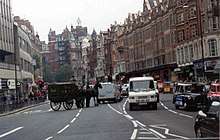1993 Harrods bombing
The 1993 Harrods bombing occurred on 28 January 1993 when a bomb exploded near the Harrods department store in London, England. At 9:14, two telephoned warnings were issued, saying that two bombs had been planted: one outside and one inside Harrods.[1] The store was due to open at 10:00.[1] Police cordoned off the area and began a search. However, some bystanders ignored the police cordon.[1] At about 9:40, a package containing 1 lb of Semtex exploded in a litter bin at the front of the store.[1] It injured four people and damaged the shopfront.[1][2] The cost of damage and lost sales was estimated at £1 million.[3] Harrods was previously targeted in 1974 and 1983, but the 1993 bomb was much smaller than the 1983 one.
| 1993 Harrods bombing | |
|---|---|
| Part of the Troubles | |
 Brompton Road, looking north from Harrods in 1993 | |
| Location | Knightsbridge, London, United Kingdom |
| Date | 28 January 1993 09:40 (UTC) |
| Target | Harrods |
Attack type | Bomb |
| Deaths | 0 |
| Injured | 4 |
| Perpetrator | Provisional Irish Republican Army |
Perpetrators
Those responsible were English Irish nationalist activists associated with the Provisional IRA: Jan Taylor, a 51-year-old former corporal who had served in the British Army Royal Signals Corps, and Patrick Hayes, a 41-year-old computer programmer of Irish descent, with a degree in business studies from Polytechnic of Central London and a member of Red Action.[2][3]
In March 1993, police captured them at Hayes' home in Stoke Newington, London.[4] They each received prison sentences of 30 years for the January Harrods bombing and for a second attack on a train a month later which caused extensive damage but no casualties. Hayes was also convicted of conspiracy to cause three additional explosions in 1992. Neither man had any apparent links to Ireland beyond their "unswerving support for the IRA".[5] Both were released in 1999 under the Good Friday Agreement.
See also
- Harrods bombing (1983)
- Oxford Street bombing (1974)
- Stoke Newington Road lorry bomb (1992)
- 1993 Camden Town bombing
- 1993 Bishopsgate bombing
- Provisional Irish Republican Army campaign 1969–1997
References
- Bennett, Will (29 January 1993). "Four hurt by IRA bomb outside Harrods – UK, News". The Independent. London, UK. Retrieved 19 February 2010.
- Geraghty, Tony (2000). The Irish War: the hidden conflict between the IRA and British Intelligence. JHUPress. p. 163. ISBN 0-8018-6456-9.
- Seaton, Matt (29 January 1995). "Charge of the New Red Brigade". The Independent. London, UK. Retrieved 8 February 2012.
- Mickolus, Edward (1997). Terrorism, 1992–1995: a chronology of events and a selectively annotated bibliography. Greenwood Press. p. 282. ISBN 0-313-30468-8.
- Ward, Stephen (May 13, 1994). "'Proud' IRA bombers jailed for 30 years: Police remain mystified why two Englishmen, who had no apparent connections with Ireland, became terrorists". The Independent. London, UK. Retrieved April 28, 2018.